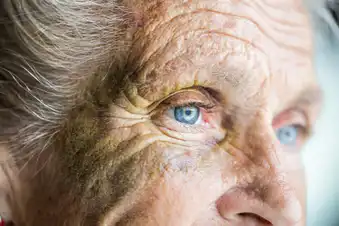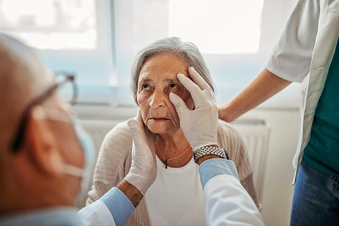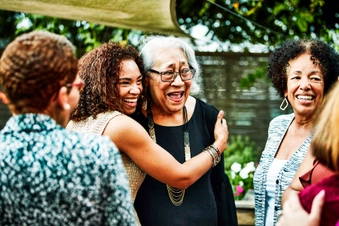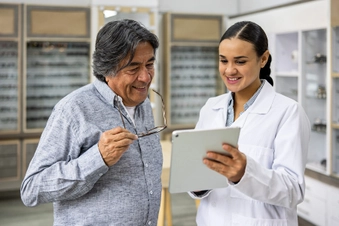Focus on Your Quality of Life with Geographic Atrophy

A Time to Refocus
Geographic atrophy (GA) affects your central vision and gets worse over time. About 1 million people in the U.S. live with the condition. There’s no cure yet, but here are some steps you can take to be more comfortable, stay healthy, and keep doing what you enjoy.

Give Yourself Some Space
Take the time you need to process your GA diagnosis and what might come next. There’s no right way to feel. Grief, anger, fear, and denial are all common reactions to vision loss. It’s important to be honest about your emotions. These feelings usually fade as time goes on and you adjust to life with GA. If they don’t, talk with a counselor or therapist so you can get the emotional support you need.

Find New Ways to Do What You Love
Losing your eyesight doesn’t mean you have to lose your identity. Look for different ways of doing the activities that make you happy. If you love to read, use an audiobook app to listen to your books. Instead of emailing loved ones, stay in touch by phone or video chat. Many people with vision loss find new ways to volunteer, work, and travel.

Make Good Overall Health a Goal
GA can affect your physical and mental health, so do what you can to protect them both. If you smoke, talk to your doctor about quitting. Eat healthy foods like dark, leafy greens and whole grains, make time for a physical activity you enjoy, and try to get at least 7 hours of sleep each night. It’s also important to manage long-term health issues, such as diabetes or heart disease, so they don’t make you feel anxious or stressed.

Try High-Tech Tools
Many devices and apps make great low vision aids. You can set up a smart speaker at home to follow your voice commands and do things like turn on lights, adjust thermostats, or change a TV channel. A read-aloud device can read a recipe or menu you find hard to see. Some apps also magnify images or describe what you’re looking at.

Put Your House in Order
Rearrange your home so you can move around safely and easily. Make sure it’s well-lit – add lights or brighter light bulbs near stairs and in rooms where you spend the most time. Tackle clutter. The less you have, the easier it is to move around by yourself. Get rid of items you don’t need or use, and organize what you decide to keep. Putting things back in the same spot helps you find them next time.

Explore New Ways to Get Around
Driving a car when you can’t see well can be stressful. Look for safer ways to get around. If public transit and rideshares aren’t options where you live, ask friends, neighbors, family members, and even co-workers if they can help. Local nonprofits and churches also often offer free rides for people who live with vision loss.

Find an Eye Doctor You Trust
You’re going to see this doctor regularly, so find someone you trust. You should feel comfortable asking questions and sharing when things seem hard. Your eye doctor can help you better manage physical challenges that pop up in your everyday life and recommend supportive services if you need them. If your current doctor isn’t the right fit, ask your doctor, friends, and family to suggest someone else.

Connect With Others
Vision loss can affect your daily routine. One in three people with GA withdraw from their social life, but doing the opposite can help. Think about joining an online or in-person support group. Talking with people who have GA and are going through the same challenges as you may help you better adjust to living with the condition.

Ask for More Support
If you hit a rough patch, plenty of experts are ready to help you out. A counselor or therapist can help you sort through your feelings and teach you new ways of coping with tough situations. A low vision specialist can offer practical tips on how to make the most of your changing eyesight. Ask your eye doctor to recommend any support services you might need. You don’t need to figure out GA on your own.
Show Sources
IMAGES PROVIDED BY:
1. E+ / Getty Images
2. iStock / Getty Images
3. E+ / Getty Images
4. Moment / Getty Images
5. DigitalVision / Getty Images
6. iStock / Getty Images
7. iStock / Getty Images
8. E+ / Getty Images
9. DigitalVision / Getty Images
10. E+ / Getty Images
SOURCES:
Cleveland Clinic: “Geographic Atrophy.”
National Eye Institute: “Finding an Eye Doctor.”
Macular Disease Foundation Australia: “Geographic atrophy and quality of life,” “Tips for living with vision loss.”
News release, Apellis Pharmaceuticals.
Harvard Health Publishing: “Is your vision impaired? Tips to cope.”
CDC: “Vision Loss and Mental Health,” “Are You Getting Enough Sleep?”
Royal National Institute of Blind People: “Coming to terms with sight loss.”
VisionAware: “Coping with Vision Loss.”
National Council on Aging: “Living with Vision Loss: Practical Tips for Safety and Independence.”
Foundation Fighting Blindness: “Coping with a Vision Loss Diagnosis.”
Prevent Blindness: “What is Geographic Atrophy (GA)?”